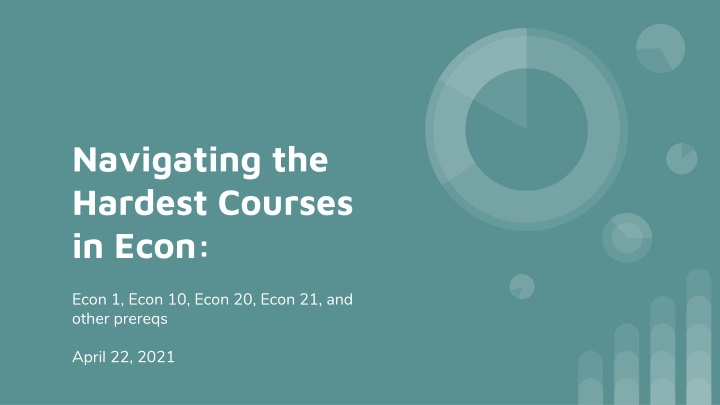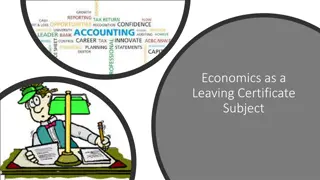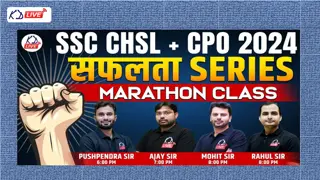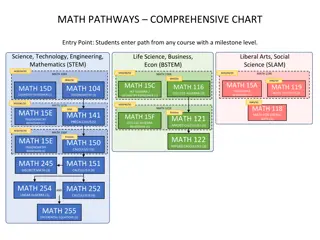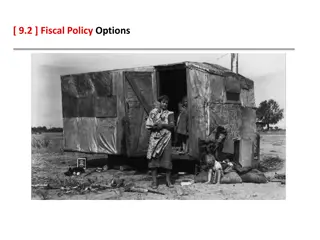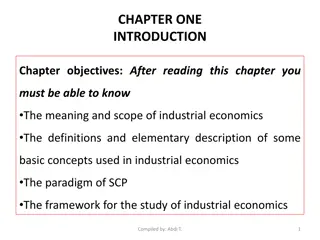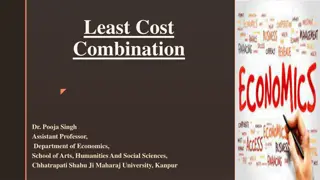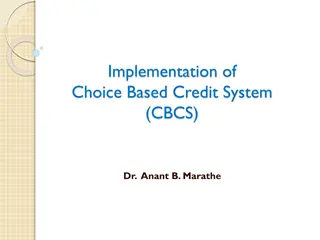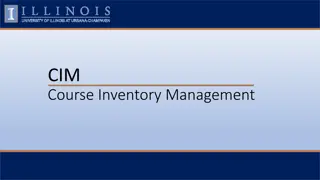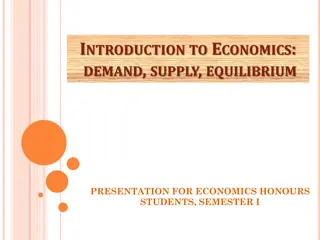Navigating the Hardest Economics Courses: Econ 1, Econ 10, Econ 20, Econ 21
Explore the challenges and insights of navigating through tough economics courses like Econ 1, Econ 10, Econ 20, and Econ 21. Get tips on succeeding in these courses, understanding concepts, and preparing for exams. Discover firsthand experiences, expert advice, and essential information for mastering these courses.
Download Presentation

Please find below an Image/Link to download the presentation.
The content on the website is provided AS IS for your information and personal use only. It may not be sold, licensed, or shared on other websites without obtaining consent from the author.If you encounter any issues during the download, it is possible that the publisher has removed the file from their server.
You are allowed to download the files provided on this website for personal or commercial use, subject to the condition that they are used lawfully. All files are the property of their respective owners.
The content on the website is provided AS IS for your information and personal use only. It may not be sold, licensed, or shared on other websites without obtaining consent from the author.
E N D
Presentation Transcript
Navigating the Hardest Courses in Econ: Econ 1, Econ 10, Econ 20, Econ 21, and other prereqs April 22, 2021
Basic Info Description: Emphasis will be placed on problems and policies of current interest as they relate to resource use and the distribution of income and output. Students will receive an introduction to the theory of supply and demand in both product and factor markets in order to examine selected topics drawn from such areas as industrial organization and antitrust policy, labor economics, international trade, economic development, agriculture, urban problems, poverty and discrimination, public sector economics, and environmental problems. Terms Typically Offered: F, W, S Potential Professors: Dept. Mandated Median: B Past Medians: 21W - B+ 20F - B+ 20W - B
What We Wish We Knew Econ 1 is not as scary as everybody makes it out to be With hard work and practice problems you can survive the class Important to pay attention to details in class I.e. problems that have been worked out on the board Readings are very conceptual, but the problems are more quantitative so its important to understand applications of concepts
Tips to Succeed Going to office hours Making sure that you understand the concepts and how they can be applied in different situations Pay attention during class (sometimes might be hard, but is super important) Practice, practice, practice before the exam
Econ 10 (Intro to Statistical Methods)
Basic Info Terms Typically Offered: F, W, S Description: Intro to Statistics Potential Professors: Doyle, Agah Introductory course to stats where you learn: regressions, data collection, omitted variable bias, probability, and fundamental econometric analysis. Dept Mandated Median: B Past Medians: Very similar material to AP statistics. 21W - B+ 20F - B+ 20W - B+
What We Wish We Knew, and Tips to Succeed How to prepare for exams How to apply learned content in exams The value of going to office hours Finding a study partner who is driven and good at stats! How unhelpful the textbook problems are. Focus on practice material provided by the professor!
Basic Info Description: Econometrics is the statistical analysis of economic data. This course focuses on regression analysis (specification, estimation, and hypothesis testing) and problems and pitfalls in its application in economics. The course involves extensive use of the statistical program STATA and will enable students to implement their own empirical research projects in preparation for the culminating experience in the economics major. Terms Typically Offered: F, W, S, X Potential Professors: Dept Mandated Median: B+ Past Medians: 21W - B+ 20F - B+ 20X - B+ Prereqs:
What We Wish We Knew Course uses stata and has a final project at the end of the term that you have to do by yourself The importance of Stata Take it straight after Econ10 if you can! Don t neglect STATA!! Office hours is very helpful Focus on the detail in class lectures Don t rely on the textbook to catch you up Try find a good study partner who will push you
Tips to Succeed Read textbook and pay attention to lectures Go to TA and office hours when struggling Do not get behind in the class because everything grows on top of each other
Basic Info Terms Typically Offered: F, W, S, X Description: In this course, you study pricing and allocation of resources (decisions) for the individual person or company. You get a more in-depth look at demand and production functions in both competitive and non-competitive markets. Think of it as a more in-depth version of Econ 1. Potential Professors: Petre, Gustman, Doyle Dept Mandated Median: B+ Past Medians: 21W - B/B+ 20F - A 20X - B+ Very math-heavy (knowing partial derivatives is a plus) Prereqs: Econ 1 and Math 3
What We Wish We Knew How much math we would use (not as conceptual as Econ 22) Math 3 is the prereq, even though you use partial derivatives (which you learn in Math 8) How repetitive the math is (in terms of application) The key to success is through doing practice problems
Tips to Succeed Practice, practice, practice! As is the case with math in general, the key to succeeding is doing a bunch of practice problems Learn how to write the perfect answer The same core concepts are asked again and again
Econ 22 (Macroeconomics)
Basic Info Terms Typically Offered: F, W, S, X Facts & Recs: Potential Professors: Comin, Rose - - - - Taught very differently Rose = Traditional instruction Comin = HBS Case Method Take before Econ 029, 039, 070* Dept Mandated Median: B+ Past Medians: 20F: B+ 20X: A- 20W: B+ Prereqs: Econ 1 and Math 3
Basic Info Description: In this course, you learn single- variable calculus (equivalent of AP Calc AB curriculum). You start with limits and finish with integration by parts. It is primarily taught through videos (previously Khan Academy, now prof-made lecture videos) and entails a lot of work including daily online homework (Webwork) and weekly written homework. This course is fairly standardized since so many students take it. Terms Typically Offered: F, W Potential Professors: varies, usually grad students Past Medians: 21W - B+ 20F - B+/A- 20W- B 19F - B
What We Wish We Knew This course would be taught primarily through videos How much work the homework would be (very time-consuming) What the exams would look like
Tips to Succeed Ask for help (whether it s from professors, the tutorial leader, or peer tutors!) Practice, practice, practice!
Final Thoughts Courses that are enjoyable: Econ24 (Development), Econ 25 (Competition and Strategy), Econ 27 (Labor with Anderson*), Econ 28(Public Finance and Policy) , Econ 32 (Macro With Levin) Courses that are notoriously difficult: Econ 26 (difficult but v interesting), Econ 29, Econ 39, and Econ 36.
Resources Layuplist : https://www.layuplist.com/ Econ Course Syllabi: https://economics.dartmouth.edu/undergraduate/course-syllabi Econ Course Schedule: https://economics.dartmouth.edu/undergraduate/course- listings/class-schedule Peer Tutoring (through ASC): https://students.dartmouth.edu/academic-skills/tutor- clearinghouse/about-tutor-clearinghouse Past Course Webpages - Math 3: https://math.dartmouth.edu/courses/by-course/#m3 Syllabus - Math 3: https://math.dartmouth.edu/undergraduate/first-year- students/placement-info/syllabi/m3-syllabus.php
